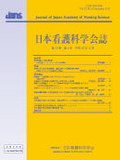Japanese
English
- 販売していません
- Abstract 文献概要
- 参考文献 Reference
要旨
消化器外科病棟で手術を受ける65歳以上の患者84名を対象に,看護師が日本語版NEECHAM混乱・錯乱状態スケールを用いて,術後1〜7日目までの患者の混乱・錯乱状態を評価した.その後看護師31名を対象に,NEECHAMの使用をルーチンワークとする可能性等について質問紙調査を実施したところ,「スケールを使用してせん妄の観察力や判断力がアップした」という者は全体の22.6%,「スケール使用による業務負担が大きい」という者は76.7%,病棟でのスケール使用のルーティン化については,「今の忙しい病棟では望まないが,もう少し余裕のある状況であれば望む」が35.5%,「望まない」が38.7%,「なんともいえない」が22.6%であった.今後の課題として,事前研修や業務量などの環境調整,NEECHAM評価をいかに患者ケアに生かすかという観点からのスーパービジョンや,事例検討会の開催等の必要性が示唆された.
Abstract
In this study, nurses working in a digestive surgery ward used the Japanese version of the NEECHAM Confusion scale to screen 84 elderly patients (>65 years) for delirium and confusion on days 1-7 after gastrointestinal surgery. Subsequently, 31 nurses completed the questionnaires about the possibility of introducing the scale as a strategy for prevention of postoperative delirium. As a result, 22.6% of the nurses reported that using the scale improved their observation and judgment skills, and 76.7% reported that the burden of its implementation was very heavy. Furthermore, regarding the possible introduction of this scale, 35.5% felt that the scale could not be introduced in current busy wards (units), but would like to it to be introduced if they had sufficient time. Another 38.7% did not wish the scale to be introduced, and 22.6% chose “Anything can be said about it.” As future subjects, the necessity of prior training, environmental management such as the amount of business, and supervision/case conferences with a viewpoint how to use the NEECHAM efficiently in patient care were suggested.
Copyright © 2013, Japan Academy of Nursing Science. All rights reserved.


